How Businesses Choose Resources for Social Media Marketing

How Businesses Choose Resources for Social Media Marketing
Businesses primarily rely on in-house staff for social media marketing, followed by social media marketing software and digital agencies. The Manifest surveyed 344 social media marketers to help you choose the best resources for your business’s social media marketing strategy.
When it comes to social media marketing challenges, businesses primarily struggle with a lack of human and financial resources, followed by a lack of formal strategies, according to a recent survey by The Manifest.
These scarcities complicate businesses’ relationships with social media marketing, but outside resources can help.
Not every business seeks outside help for their social media, though.
The Manifest found that a majority of businesses keep social media marketing in-house. The rest look to social media management software and/or a digital marketing or a social media agency to help with social media marketing.
This article outlines the processes and factors that influence the resources businesses select for social media marketing.
To provide this data, The Manifest surveyed 344 social media marketers at both B2B and B2C companies around the world with more than 10 employees.
Use this report to understand how businesses choose between social media marketing resources and to better select your own social media resources.
Our Findings
-
The majority of businesses (85%) use in-house staff for social media marketing.
-
Social media management software is the most popular outside resource (43%), followed by digital marketing or social media marketing agencies (28%), and freelancers/consultants (9%).
-
When searching for quality help, businesses rely on referrals (43%) to guide them toward a social media marketing agency.
-
Those that hired a social media marketing agency cite price (40%), referrals from a friend/colleague (37%), and culture fit (31%) as the most relevant factors in their hiring decision.
-
Agency partnerships can challenge businesses. The primary issues faced during partnerships are performance tracking (43%), limited understanding of company strategy (41%), and a lack of innovative or practical ideas (37%).
-
Decisions about social media marketing software are primarily influenced by referrals (24%), though businesses also rely on Google searches (21%) and marketing content (17%).
-
Businesses choose social media marketing tools by considering features (40%), price (32%), and free trials (27%).
In-House Staff Used Most Frequently for Social Media Marketing
Many businesses choose to use in-house staff instead of costlier third-party options. The Manifest’s research confirmed that most businesses (85%) use in-house staff to execute their social media strategy.
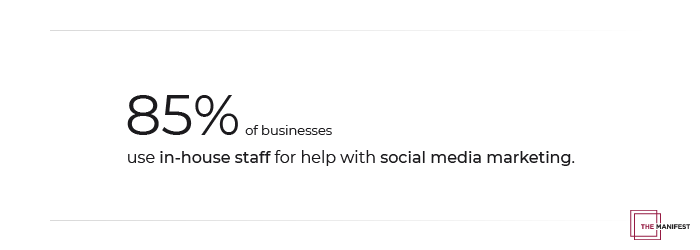
In-house staff provide many benefits over contracted outsiders. In-house employees are likely already fluent in a business’s brand voice. With staff on hand, it’s also easier to control the quality of content and stay responsive to online trends.
In-house staff, however, may not have the skills and expertise necessary to maximize the success of your social media strategy. If you choose to use in-house staff, you must thoroughly understand your current strategy and your future plans to produce results.
“Understand which marketing tactics your business needs and the resources and skill level needed to do it,” Julie Howell, Marketing Director at Postali, said. “If you're interested in social media and doing a weekly newsletter, you can likely find a local specialist and hire in-house.”
Though familiar with your business’s brand, in-house staff often have gaps in their skills.
Private contractors let businesses supplement their in-house social media skills at minimal cost. Despite this, The Manifest’s research found that just 9% of businesses use freelancers and/or consultants to help with their social media.
Contracted help can be a targeted solution for certain tasks, but may fall short for long-term or particularly large projects. Similarly, the hiring and onboarding of contractors is a time-intensive process many businesses cannot afford to undergo.
If in-house staff or contractors do not fulfill your business’s needs, you may need to look for an agency.
“If you're looking for more comprehensive marketing services, an agency is a better bang for your buck as they often have staff skilled in many areas of marketing."
“If you're looking for more comprehensive marketing services, an agency is a better bang for your buck as they often have staff skilled in many areas of marketing,” Howell said.
Ultimately, whether your business uses in-house staff or outside help for social media is determined by your intended marketing goals, available resources and expertise, and willingness to pursue other options.
Agencies and Software Can Boost Social Media Marketing Capabilities
When faced with numerous social media challenges, third-party sources can provide necessary expertise and functionality. Many businesses are reaching for outside resources to support their in-house social media marketing efforts.
Social media management software is the most popular outside resource at 43%, followed by digital marketing or social media marketing agencies.

The social media landscape grows increasingly sophisticated. The average internet user now has over seven social accounts and 98% of internet users are on social media.
Faced with this expansion, 20% of marketers spend 50% of their time manually engaging their audience on social media.
Software allows businesses to add to their in-house capabilities. Meanwhile, outsourcing to an agency can remove the task almost entirely from a business’s workload.
As the more popular option, social media software tools, such as AgoraPulse and Buffer, allow businesses to increase their productivity and efficiency. While social media tools require some in-house time and skill, they can produce significant results for your team and brand.
“Automating specific processes within your social media marketing campaign can decrease the time you and your team spend [on social media],” Kevin Payne, a SaaS growth consultant, said.
As the market for social media marketing solutions expands, finding a robust, user-friendly, and affordable option is increasingly straightforward.
By comparison, a social media marketing agency can better help your business with larger and more intensive projects, like implementing a new strategy or rebranding. A business must ensure they pick the right agency partner, though.
“Finding the right fit for your budget and timeline is extremely important when vetting social media marketing agencies,” Derric Haynie, CEO of Vulpine Interactive, said. “The important thing to consider is whether or not the agency is structured to provide you with the best experience and results.”
“Finding the right fit for your budget and timeline is extremely important when vetting social media marketing agencies."
Your business’s goals are unique, and you need a partner who can thoroughly understand them and execute the best social media strategy for your audience.
Both social media management software and agencies can increase a business’s social media capabilities and success. How can a business pick the right outside resource for their needs, though?
Referrals Drive Awareness of Social Media Agencies
If you decide to go with a digital or social media marketing agency, choosing the right partner is critical.
The sheer volume and varying quality of agencies, however, makes for a dizzying selection process. Consider that a Google search for “social media marketing agency” returns over 255 million results.
Unsurprisingly, businesses rely most on referrals (43%) to guide them toward a social media marketing agency. Recommendations from trusted sources are both a cost- and time-effective way for businesses to predict a quality outcome with an agency partnership.
Businesses were less likely to find a partnership via Google searches, the agency’s own marketing content, and advertisements.

This data aligns with the HubSpot Agency Growth Report 2018, which showed that agencies struggle with lead generation and are reliant on referrals to drive business.
This preference for referrals stems from a need for results over reputation.
“Companies are made up of people,” Tom Bernthal, CEO of Kelton Research, said. “And when CMOs need results, they don't need a name on the door, they need a team of partners that is sharp, creative and dedicated."
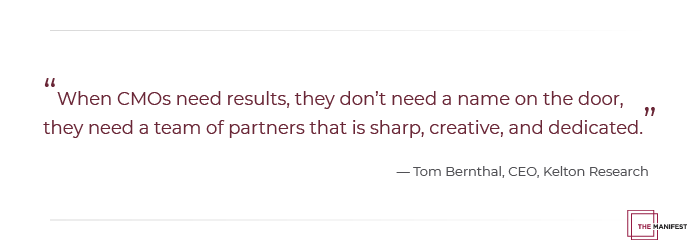
Referrals simplify the selection process for marketers under pressure. Peers can often better suggest an agency candidate that matches a business’s desired price and level of experience.
Selecting a Social Media Agency Is a Human Affair
The running joke is that partnering with an agency is like marriage. Both can fail and both are challenging – even when they succeed. Before making a commitment, a business and an agency must align their processes, needs, and expectations.
Businesses that hired a social media marketing agency cite price, a referral from a friend or colleague, and culture fit as the predominant factors that influenced their final decision.
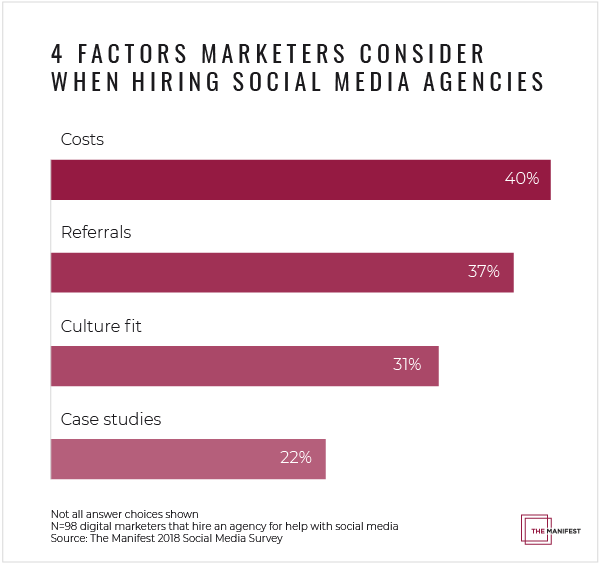
Interpersonal factors carry a lot of weight in social media partnerships. Businesses are trusting agencies to be their voice on social media, which is a very public platform.
Businesses determine trustworthiness for this task through both hard numbers and qualitative appraisals, such as client references and online reviews.
Bottom-dollar agencies can be a gamble, since you often get what you pay for. Expertise doesn’t come cheap on either side, said Neil Patel, founder of CrazyEgg and QuickSprout: “Trying to cut corners when choosing the right digital marketing service is always a bad idea. Like it or not, you will have to dish out money if you want good results.”
Highly trained social media agencies charge top-dollar because they have the expertise to carry out your social media strategy successfully: “I know how much training, experience, creativity, and hard work is needed to become an expert in the niche,” Patel said. “Trust me when I say that a professional web marketing agency knows a lot more than you do.”
Businesses look beyond referrals when researching agencies, though less frequently. Case studies (22%), client references (17%), online ratings and reviews (16%), and the agency’s own social media presence (14%) were all evaluated to some degree.
Businesses’ emphasis on referrals and culture suggests that a hiring decision ultimately depends on personal comfort.
“From my perspective, the most important factors in choosing a digital marketing partner are 1) can they do the job, and 2) do you like working with them? In the end, that’s all that matters,” said T. Maxwell, owner of Emaximize, a digital agency.
“From my perspective, the most important factors in choosing a digital marketing partner are 1) can they do the job, and 2) do you like working with them?"
The longer the partnership’s duration, the more important it is to evaluate the agency’s personality and communication skills. Maxwell shares an anecdote reflecting the significance of culture fit:
“I was once hired as a chief information officer for a billion dollar organization, and I asked my boss why I was chosen over some heavy hitters in the industry, as I was relatively young,” Maxwell said. “He told me, ‘I like to hire people with a degree in mathematics and who also pass my beer test.’ When I asked what that meant, he said, ‘At the end of the day, I ask myself if I want to have a beer with this person.’”
A great relationship leads to great results. A relationship full of conflict and misunderstanding, however, will lead to challenges and undercut success – all at a cost.
Agency Relations Can Cause Operational and Performance Based Challenges
Once an agency partnership begins, businesses often find themselves with headaches.
The top challenges businesses have with agencies include performance tracking, limited understanding of company strategy, and lack of innovative or practical ideas.
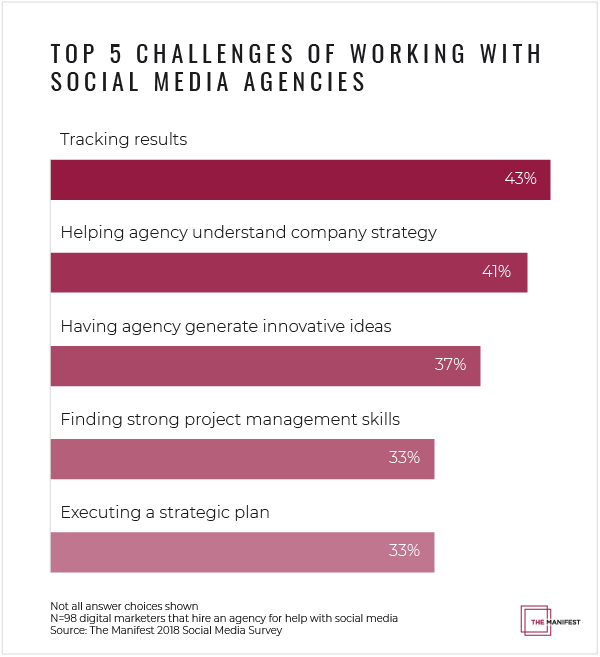
Unsurprisingly, only 11% of surveyed respondents reported no issues when working with an agency. This aligns with findings from Forrester’s Global Digital Outlook Survey that showed an uptick in companies reducing their spending with outside marketing agencies – 27%, up 7% from 2016.
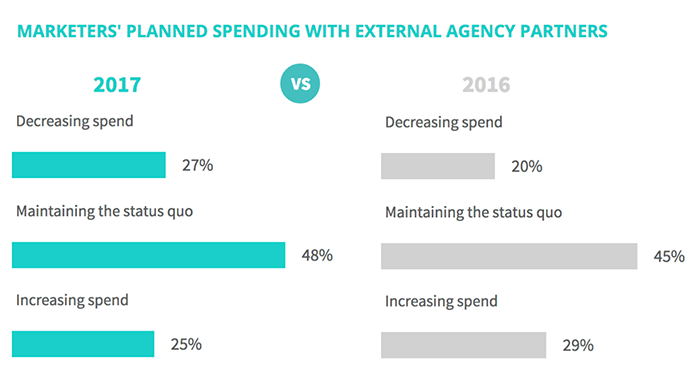
Shannon Latta, vice president of marketing at Horn Group, holds agencies responsible for coming up short.
“It's clear: Agencies need to be more disruptive in presenting bold ideas and driving change,” Latta said.
The HubSpot Growth Report shows that as margins continue to fall, agencies struggle to stay current and effective. Of those surveyed by HubSpot, many suffered from personnel issues and insufficient resources.
Businesses must ensure agencies won’t fall prey to these existing issues before beginning a partnership. To gauge the suitability of an agency, ask the following questions:
- What are your core competencies?
- How do you research and analyze my industry?
- Where are some examples of success in my industry?
- How do you handle content development?
- What are some examples of you adjusting a strategy mid-execution?
- What is your reporting process?
- How do you measure success?
- Who is my direct contact?
Before you sign a contract, ensure a prospective partner can overcome the pitfalls currently impacting a large number of agencies.
The Search for Social Media Marketing Tools Is Less Personal
The options for social media marketing software are numerous and varied. Similar to social media marketing as a whole, the industry’s software solutions are highly valued but often not well understood.
The search for social media marketing software is most strongly influenced by referrals (24%), followed by Google searches (21%), marketing content (17%), and advertisements (4%).
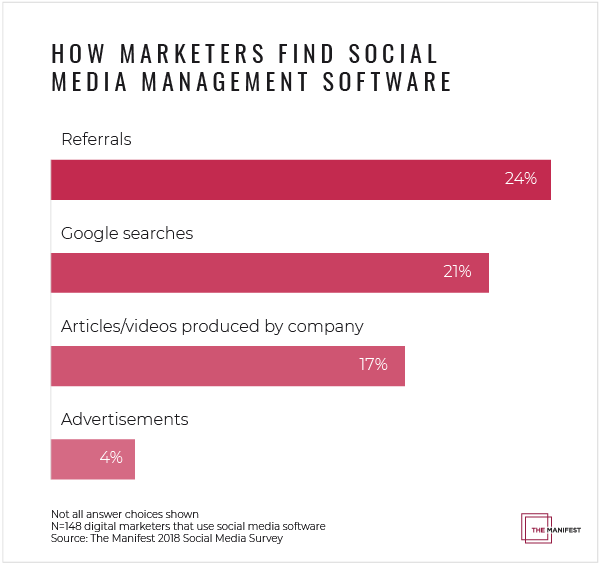
Currently, recommendations outpace independent evaluations by a thin margin. But this could change as marketing automation becomes a fixture for businesses.
According to a recent survey from MarketingProfs, 33% of B2B companies currently use marketing automation for social media. Of the surveyed respondents, 44% plan to adopt these tools in the future.
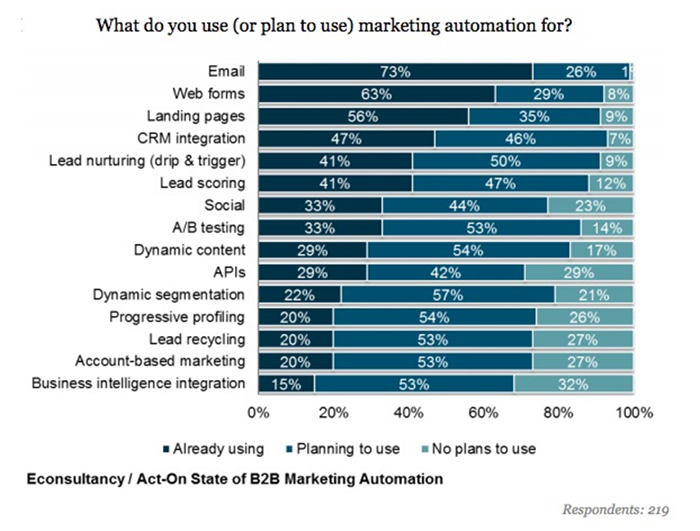
Competition in the social media sphere will increase software adoption, leading to greater information available online about different social media marketing solutions. As the value of these tools becomes more familiar, information found via search engines and content marketing could exceed referrals as the primary way to gain awareness.
Two types of software exist: one that orchestrates campaigns and another that manages cross-functional teams. Both automate tasks and facilitate productivity, yet which type of tool you pick depends on what you need to get done.
For example, campaign software like Sprinklr lets you monitor social media interactions, coordinate organic and paid media, and use sentiment analysis. A tool like Buffer is suited to helping your team schedule, optimize, and collaborate around its social media content. Before choosing, you must ask yourself – what is the primary task you’d like to use your software for?
Decide the marketing tactics and platforms you’ll engage with before purchasing a solution, said Lu Chen, senior director of growth at THINX.
“Audiences, interactions, and content are unique to each platform,” Chen said. “As a result, your systems for project management and media buying will and should differ from one platform to the next.”
“Take Facebook and Instagram, for example,” Chen continued. “Your Facebook audience demonstrates different behaviors than your audience on Instagram. As a result, the solution that you build to generate target audiences should be different between Facebook and Instagram.”
You must understand your specific social media goals to pick the best software solution for your needs.
Cost, Features, and Feedback Lead to Social Media Management Software
A business’s ideal social media software solution must enhance the team’s existing workflow, while also being cost-effective. It makes sense, then, that businesses prioritize features (40%), price (32%), and free trials (27%) when picking a solution.
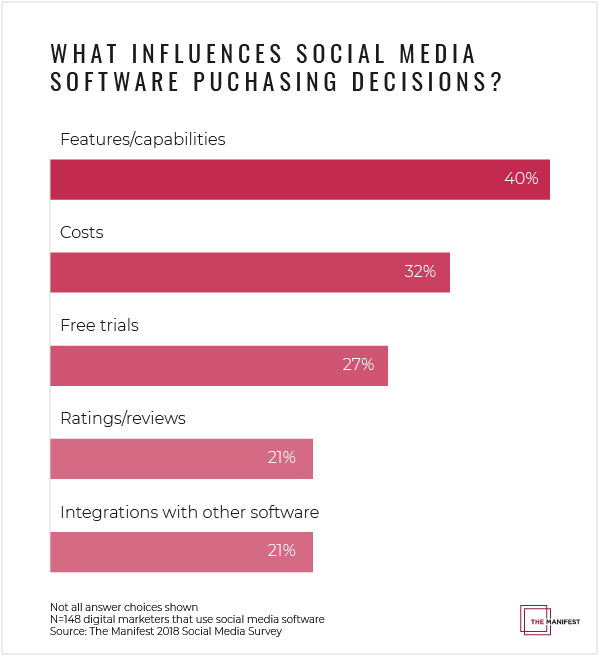
These data points reflect how usability, price, and social proof are of similar importance when picking a social media software.
An ideal solution fits with your business’s existing channels, future growth initiatives, and your audience’s content preferences. This choice can be difficult, however, according to Justin Freid from MarTech Today.
“One of the key things to look at in this space is fragmentation,” Freid said. “While there are tools that cover paid promotion, social listening and the management of social profiles, many tools specialize in one specific area, while others cover two, or even all three, areas of social. For a brand, understanding your business needs – and which tools can best fulfill those needs – will be vital in making an informed decision.”
You might need to choose between features such as post scheduling, content creation, engagement and brand mention monitoring, social demographics, or reporting. But frequently, business’s needs for social media strategy can be found in one solution.
Research from TrustRadius shows that companies prefer to use just one platform.
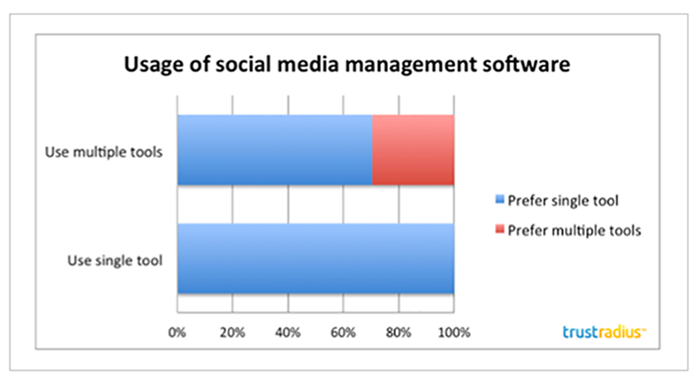
Keeping the desired functions within one solution may require research but is a serious benefit to businesses of a certain size.
Social Media Marketing Resources Strengthen Existing Strategies
Social media marketing is a confusing task for many businesses. As a result, businesses reach for a mix of in-house, outsourced, and technological resources to support their capabilities for this essential yet undefined marketing process.
Businesses favor their own in-house staff for social media. Software and agency teams were the second and third most popular choices, respectively. Lastly, a small number chose to hire freelancers and consultants for expertise.
Businesses most often use referrals to learn about and choose between options. Asking peers for advice builds confidence when making the decision to hire an agency or purchase a software solution.
Ultimately, either a social media marketing software or an agency can provide numerous benefits to your business, but each requires a different approach.
Social media marketing software can help a business with a number of customer- and business-facing issues. You can enhance your social media presence or streamline your workflow, but you must ensure your selected software matches your desired functionality and marketing goals.
A social media marketing agency gives you the expertise needed to execute big-picture initiatives. Agency partnerships are a complex and intensive relationship, though, so you must pick a team that fits both your desired skill and your company’s culture.
About This Survey
The Manifest surveyed 344 social media marketers at both B2B and B2C companies around the world with more than ten employees.
Most survey respondents are managers (38%), senior managers (22%), and associates (17%).
Most respondents are from the United Kingdom (30%), United States (22%), Australia (5%), India (5%), and Germany (3%).
